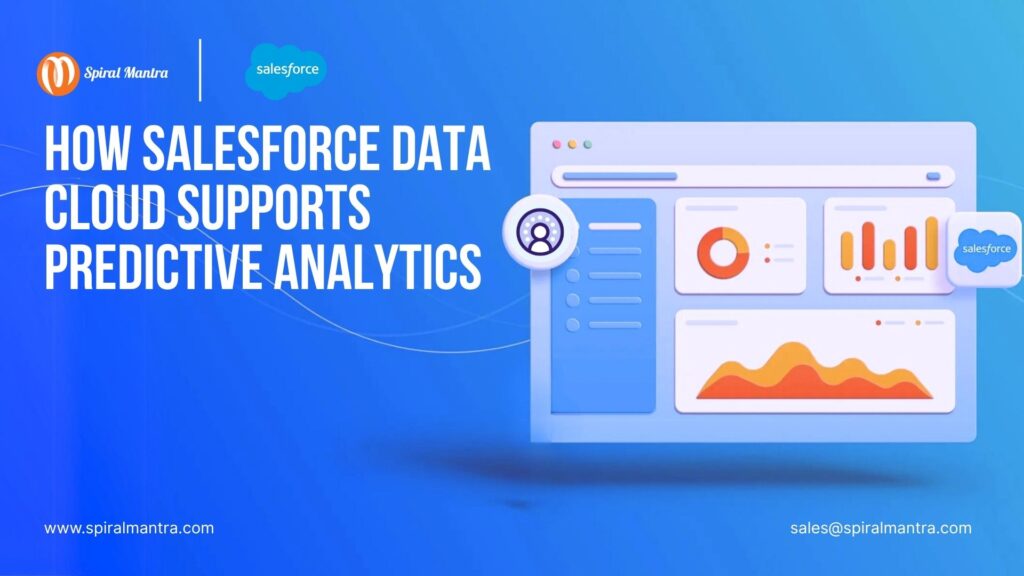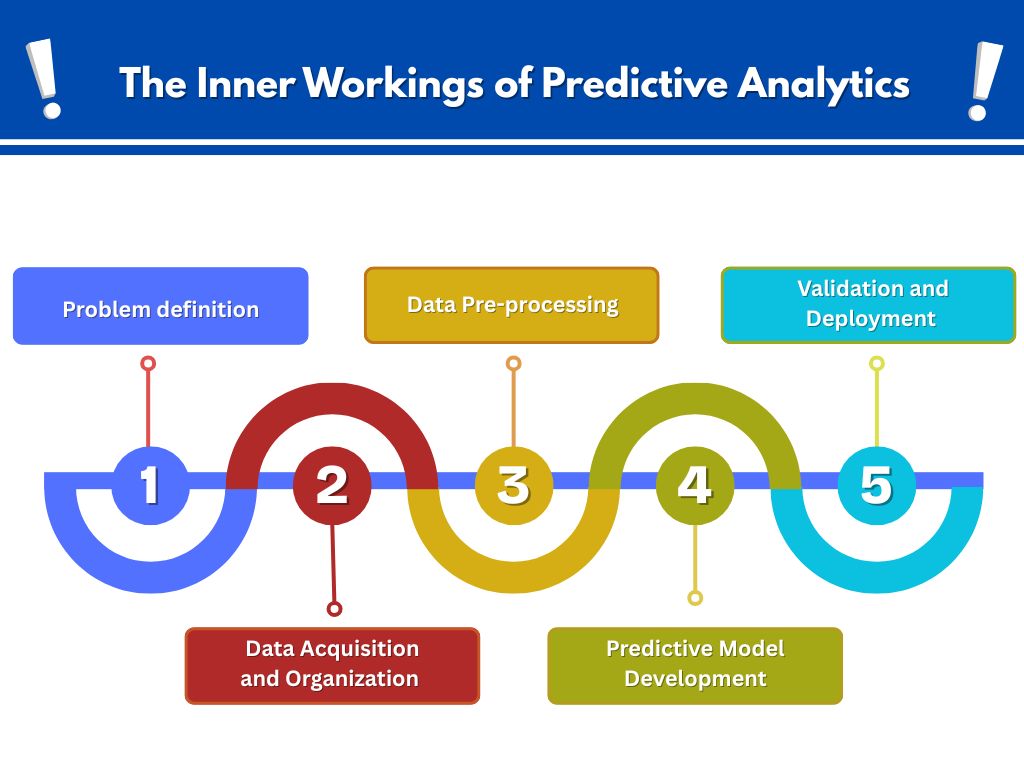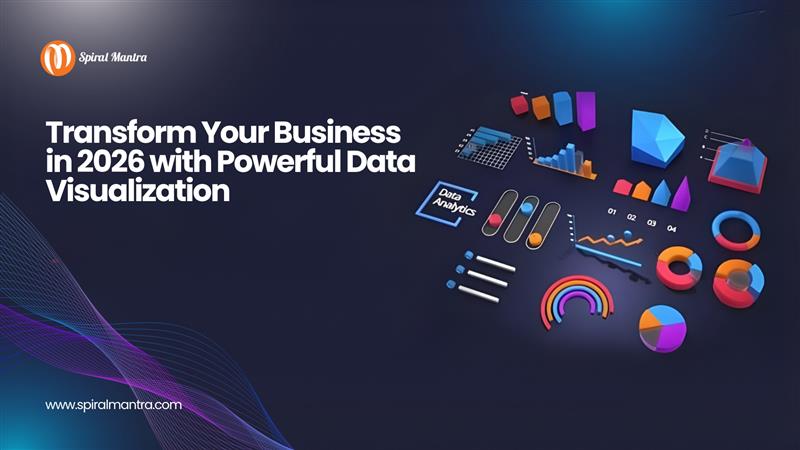
Exploring Predictive Analytics and Its Impact on Business Decision-Making
This era belongs to data, and predictive analytics stands at the forefront of supporting data-driven governance. Outlining a report by Statista, 91% of businesses increased their investment in analytics by utilizing Salesforce Data Cloud, as the transformative platform is poised to revolutionize data and its management systems. Right from unifying disparate information sources to get real-time profile monitoring, Salesforce Data Cloud supports predictive analytics powered by AI and machine learning algorithms to enhance workflows, and we will support this stance with the following article. This section is dedicated to elaborating on what predictive analytics is.
What if you could predict your business’s future? Then, undeniably, you got your answer for “What could happen next?” Within the realm of AI and prognostic analytics, the data cloud by Salesforce has emerged as a key player, playing a crucial role in big data development. Predictive insights have also caught a lot of attention by expanding the horizons of statistical models with their scope to anticipate trends and behaviors.
This section is dedicated to elaborating on what predictive analytics is.
What if you could predict your business’s future? Then, undeniably, you got your answer for “What could happen next?” Within the realm of AI and prognostic analytics, the data cloud by Salesforce has emerged as a key player, playing a crucial role in big data development. Predictive insights have also caught a lot of attention by expanding the horizons of statistical models with their scope to anticipate trends and behaviors.
Technical Architecture: The Foundation of Predictive Excellence
Let me ask you this: What if you could predict your business outcome with precision using the key role information from all your systems? Predictive excellence is what you require to get meaningful insights into your outcomes. This is where the Salesforce data cloud supports predictive analytics by utilizing predictive models with statistical techniques integrated with machine learning algorithms to predict the future.
Data Ingestion and Harmonization Engine
The Data Cloud Salesforce operates on a robust technical architecture designed for high-volume, real-time information processing. The platform's ingestion engine can handle over 1 billion customer records per hour, supporting both batch and streaming integration through- Salesforce Connect: Direct API integration with external systems
- MuleSoft Anypoint Platform: Enterprise-grade information integration middleware
- Apache Kafka-based streaming: Real-time event processing with sub-second latency
- ETL/ELT pipelines: Custom information workflows and transformation using Talend and Informatica connectors
Data Lake Architecture and Storage Optimization
The platform utilizes a cloud-native data lake architecture built on Amazon S3 and Azure Data Lake Storage, providing.- Petabyte-scale storage capacity: Supporting organizations with 100M+ customer records
- Columnar storage optimization: 60-80% compression ratios using Apache Parquet format
- Multi-tier storage management: Automatic lifecycle policies for cost optimization
- ACID compliance: Ensuring intelligence consistency across concurrent analytical workloads
Core Predictive Analytics Capabilities
Einstein Analytics and AI-Powered Insights
Salesforce Data Cloud integrates seamlessly with Einstein Analytics, providing sophisticated predictive modeling capabilities:Customer Lifetime Value (CLV) Prediction
- Machine learning models achieving 82% accuracy in CLV forecasting
- Gradient boosting algorithms (XGBoost, LightGBM) for high-dimensional feature analysis
- Real-time scoring engines processing 10,000+ predictions per second
- A/B testing frameworks for model performance validation
Churn Prediction and Prevention
- Neural network models with 89% precision in identifying at-risk customers
- Ensemble methods combining logistic regression, random forests, and deep learning
- Feature engineering pipelines analyzing 200+ behavioral indicators
- Automated early warning systems trigger intervention workflows
Lead Scoring and Conversion Optimization
- Probabilistic models achieving 73% improvement in sales-qualified lead identification
- Natural language processing for sentiment analysis of customer interactions
- Graph neural networks for relationship mapping and influence scoring
- Dynamic scoring algorithms adapting to seasonal and market variations
Advanced Analytics Toolchain
Salesforce Analytics Studio
- Drag-and-drop interface for data scientists
- 50+ pre-built statistical functions and algorithms
- Custom R and Python script integration for advanced modeling
- Automated model deployment with MLOps best practices
Tableau Integration
- Native connectors enabling sub-second query performance
- Advanced visualization libraries for model interpretation
- Statistical significance testing for A/B experiments
- Collaborative analytics workspaces for cross-functional teams
Technical Implementation Strategies
Data Modeling and Feature Engineering
Effective predictive analytics in the Salesforce cloud requires sophisticated data modeling approaches:Dimensional Modeling Techniques
- Star schema implementations for optimized query performance
- Slowly changing dimensions (SCD) for historical trend analysis
- Bridge tables for many-to-many relationship modeling
- Aggregation strategies reduce computation time by 70%
Feature Engineering Pipelines
- Automated feature selection using recursive feature elimination
- Principal component analysis (PCA) for dimensionality reduction
- Time-series feature extraction for temporal pattern recognition
- Real-time feature stores with millisecond serving latency
Machine Learning Operations (MLOps)
Model Development Lifecycle
- Version control systems integrated with Git for reproducible experiments
- Containerized model training using Docker and Kubernetes
- Hyperparameter optimization with Bayesian search algorithms
- Cross-validation strategies ensure model generalization
Production Deployment Framework
- Blue-green deployment patterns for zero-downtime model updates
- Canary releases for gradual model rollout
- Performance monitoring with drift detection algorithms
- Automated retraining triggers based on information distribution changes
Performance Metrics and Optimization
Query Performance and Scalability
The technical performance characteristics enable large-scale predictive analytics:- Query Response Times: Sub-second performance for 95% of analytical queries
- Concurrent User Support: 10,000+ simultaneous users with consistent performance
- Data Refresh Frequency: Real-time updates with 15-second factual latency
- Model Training Speed: 80% reduction in training time through distributed computing
Cost Optimization Strategies
Resource Management
- Auto-scaling compute resources based on workload demands
- Spot instance utilization reduces infrastructure costs by 60%
- Query optimization techniques improve efficiency by 45%
- Data compression and partitioning strategies minimize storage costs
Future Roadmap: Emerging Technologies
Advanced AI Integration
Salesforce continues to enhance predictive capabilities with cutting-edge technologies:- Large Language Models (LLMs): Integration with GPT-style models for natural language queries
- Automated Machine Learning (AutoML): Self-optimizing model selection and hyperparameter tuning
- Quantum Computing Readiness: Exploration of quantum algorithms for optimization problems
- Edge Computing: Distributed analytics for real-time decision-making
Ethical AI and Compliance
- Bias Detection Algorithms: Automated fairness testing across demographic groups
- Explainable AI: Model interpretability tools for regulatory compliance
- Privacy-Preserving Analytics: Homomorphic encryption for secure computation
- Audit Trails: Comprehensive logging for algorithm accountability

